How to Raise Backyard Chickens - FAQ for Backyard Chicken Care
People keep chickens today for a number of reasons. I, for one, keep chickens because I want fresh eggs that have been produced in a clean environment from chickens who are allowed to free-range and are not medicated in any way. My eggs have lovely orange yolks, my girls lay and egg about 6 days out of 7, and although I spoil them with sweetcorn, spinach, cabbage etc. and it may not always be cost effective to have them, I wouldn't have it any other way.
My backyard chickens also provide me with some wonderful, free manure for my garden.
Raising backyard chickens is easy as long as you follow some simple rules:
- good feed
- clean hen coops
- plenty of fresh water with a little cider vinegar in the water as a boost to your chickens' health
- dose of yogurt for the digestive system
Backyard Chickens and Hen Coops
You cannot keep chickens unless you have adequate shelter for them. Your hen coop should shelter your chickens from the wind, rain, draughts and sun, as well as from snakes, wild birds and foxes.We constructed our hen coop with small diameter square wire specifically to protect our chickens from snakes as we live in an area where there are a lot of these horrible creatures.
Your hen coops should also have good drainage and ideally on a concrete floor. If your coop doesn't drain and is always wet this will breed disease.
Although you need to protect your backyard chickens from draughts and wind, on the other side, your chickens should also be given good ventilation to their hen coops.
Finally don't overcrowd the coop. Only stock the hen coop with the right number of chickens to keep down the chance of illness and disease. Now that the children have gone off to pursue their own lives there is just my husband and I at home, and we have 3 laying hens that keep us in enough eggs. When we have a surplus, which isn't that often as I also do a fair amount of baking, then I give the eggs away to friends and neighbours who don't have chickens of their own.
If you are raising chickens in your backyard or homestead, then read up on how to care for them with these questions and answers. See how to avoid chicken diseases with good chicken care and management. We have a lot of other pages on raising backyard chickens. See the links for these at the bottom of the page.
We have several pages on raising chickens successfully, along with some pages on free chicken coop plans, so grab a cuppa, and spend some time getting to know your chickens.
How to Raise Backyard Chickens - Liver Disease
I have hens which seem well in every respect up to the time of their combs changing color, when they die within three days. The combs turn a faint yellow, almost white; they are heavy, have their usual appetite up to the lost 24 hours. I have treated by giving small doses of Castor oil in the drinking water, feeding on dry mash with plenty of green feed. There is no tendency to lameness nor limp neck. The droppings are loose and very white.
The hens are victims of jaundice, which is a form of liver disease and caused by over-feeding on rich starchy foods that also causes hens to become over fat. However, at the end of the laying season and the beginning of the molt you will lose some hens, even when kept under the best conditions, and especially hens that are fairly old. What you have done for them is fine, however, if your hens don't improve in a couple of days the hatchet cure is the only option.
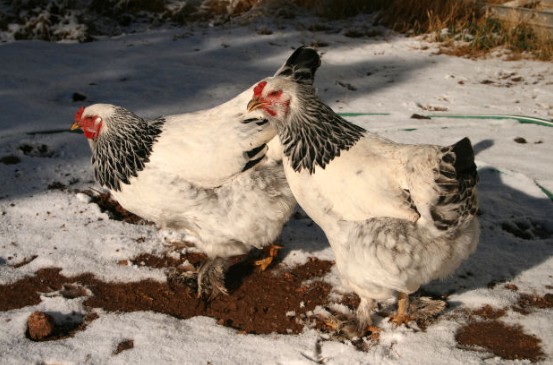
How to Raise Backyard Chickens - Rupture of Oviduct
I have had two other hens die suddenly when on the nest. The second one - we opened and found one egg broken near the vent and another with shell formed ready to be laid.
Rupture of the oviduct was probably the cause of the hens dying on the nest and is due to the same condition in the hens; that is, the straining to expel the egg necessary in the engorged condition of the internal organs from being too fat.Feeding Backyard Chickens Melons
When feeding chickens, have "stock melons" or "citrons" any merit as a green food for laying hens? Are the seeds of the above bad for hens?
Stock melons are fine for feeding backyard chickens if other succulent materials are scarce, but they are inferior to alfalfa and other clovers. The seeds won't do them any harm.Feeding Rape and Vetch to Backyard Chickens
What time do you sow rape and vetch and are they good for chickens?They are good for backyard chickens or for any other stock that likes greens. They are winter growers and should be sown in the fall as soon as the land is moist enough to keep them growing, or just as soon as you can get it moist either by rainfall or irrigation. Neither plant likes dry heat or dry soil.
Backyard Chickens and Preserving Chicken Eggs
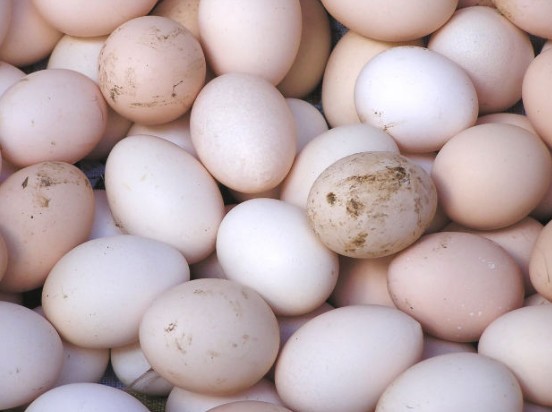
What is a good way to preserve eggs for home use?
Waterglass eggs are good enough for cooking purposes, but when boiled anyone that knows the taste of a strictly fresh egg can tell the difference in an instant; when fried the taste is not so pronounced, but it is there just the same; besides, when broken, they are a little watery. This watery condition passes off if left to stand for a few minutes.
The best way is to use the waterglass method, is one quart of waterglass to ten quarts of water. Boil the water and put away to cool, when cold add the waterglass, mixing well, and store in 3 or 5-gallon crocks in a cool place. They will keep six months if good when put in. In all cases the eggs must be gathered very fresh, for one stale egg will spoil the whole lot, so great care is needed. For more information see our page on spring time on the farm.
Backyard Chickens and Lice Treatment
How do you dip hens to kill lice?
To dip chickens you must have a very warm day, or a warm room where you can turn them in to dry. Be very careful that the liquid does not get in the fowl's throat. It is best to make the hen sit down and with a sponge wet the back and head thoroughly, then under the wings and breast; if there are nits, don't be in a hurry to take the hen out, but let the dip get to the nits and skin on the abdomen.
If the water is too warm it will be dangerous, as some fowls have weak hearts; that is the only danger, providing you dry them quickly. Give them a final shower using some tea-tree oil in the water. A tablespoonful in a liter of water should do it. Add a couple of drops to the feathers on a daily basis until the invasion clears up.
Clean your chicken coops out and clean thoroughly including perches, hoppers etc.
Curing Backyard Chickens of Eating their Feathers
What is the cure for feather-eating?
Feather eating is the result of being bored or a shortage of green feed. The best way to cure it is to give your chickens exercise. Boil some oats until soft, and when cooked stir in salt enough to taste and about a quart of good beef scrap; feed this for breakfast several mornings together.
Make them scratch for the rest of their food in deep litter and give them sour milk to drink if you have it. The object is to give them some interest. See that the fowls are supplied with mineral matter, such ash shells, bone meal and some sand if it can be had. It is surprising the amount of sand that chickens will eat when carried to them in yards, so there must be a necessity for it, and if they cannot get to it, it pays to carry a good box full once in a while.
Cannibalism in Backyard Chickens
What can I do to cure my chicks of eating each other?
Some kind of animal food is necessary when the chickens begin to pick toes, wings and vents. But the meat must always be cooked, the least bit of raw meat drives them wild as does the blood they can bring on each other. For that reason a strict watch must be kept to detect any case before they get to that stage.
Remove all weak chicks as they always go for the weakest, and as soon as one chick is picked on for a victim, remove it at once. Paint the toes bitter aloes mixed with water. It is best to buy a powder, then dissolve in a little water and paint wings, vent and toes. They won't take many pecks at them when they find they are so bitter.
Feeding Backyard Chickens Sunflower Seeds
What is the food value of sunflower seed as a ration for fowls, mostly laying hens? Should sunflowers be fed whole or crushed?
Sunflower seed is rich in oil, having the same proportion as flaxseed; otherwise it rates in value the same as grain. A little, not too much, fed whole is a nice treat for the fowls and is said to make their feathers shine for birds for shows.
Clipping Backyard Chickens for Cleanliness
My chickens foul all the feathers below the vent; they appear healthy, but do not look nice. What can I do?
Take a pair of scissors and clip the fluff away from that part of the abdomen, give a teaspoonful of olive oil, and notice of they have any discharge that is of an offensive color or odor.
Sometimes it is nothing but pure laziness with hens of the large breeds that causes this matting together of the fluff below the vent. We rarely see hens of the small breeds so affected. Whenever a hen soils her feathers clip her at once, and, in fact, it is a good custom to follow up in any case. When hens are very heavily fluffed it interferes with the fertility of the eggs. In such cases there is not anything for it but use the scissors.
Backyard Chickens - Bowel Trouble in Young Chicks
What is the cause of bowel trouble in young chicks, and what to do for it?
Bowel trouble in very young chicks is usually caused by a chill. It is very hard for us here to believe chicks get chilled because, not feeling the cold ourselves, we forget that chicks have really undergone a violent change from incubator to the outside atmosphere.
Great care should be taken in moving chicks from incubator to brooder oven, and also in seeing that the brooder itself is warm and fit to receive the chicks. If one is careless in these matters the chicks feel the change and suffer from bowel trouble.
Sometimes, of course, the trouble may be traced to the food, but more often it comes from a chill. The best way to cure it is to remove the chicks to new ground at once, or if in a brooder, clean it out well and spray with some disinfectant. Boil all the water that is given to the chicks and feed boiled rice once or twice a day in which a little cinnamon is mixed. Do not put in too much or they will not eat it, keep all meat away and just feed dry chick feed and boiled rice. No oatmeal or any other cereal but the rice; if chicks won't eat it, feed dry chick feed and boiled water and a little lettuce.
Backyard Chickens - Quick Roosters and Laying Hens
How can I get the young roosters off quick and the hens to lay in winter?
These two happy results come from correct methods of poultry keeping from the ground up. To get the cockerels off quick, they must be hatched from strong-germed eggs, incubated properly and kept growing from the first jump out of the shell. To get eggs in winter the pullets must come from the same conditions. Very few hens will lay in the early winter under any conditions.
Keeping Backyard Chickens in the Orchard
Kindly advise me about keeping hens in an orchard. I would like to know if they will injure the trees in any way if kept in large numbers. In what way would they benefit the trees?
From the point of view of the trees there is no doubt that they would be advantaged by the presence of the poultry, providing the coops are not allowed to interfere with the proper irrigation and cultivation. If it is practical to handle the fowls in coops without causing the soil around the coops to become compacted by continual tramping, and if they are not kept on the ground long enough to cause an excessive application of hen manure, which is very concentrated and stimulating, the result would unquestionably be beneficial.
From the point of view of the tree, this benefit would depend on how long the fowls were kept around the tree and how they are cared for in such a way that the soil should not get out of condition physically or too rich chemically for the satisfactory performance of the tree. If the backyard chickens can be moved frequently, and if they are only put in place when the soil is in such condition that tramping around the coops will not seriously compact it, the presence of fowls would be an advantage.
On the other hand, if the coops are to be kept in place for a long time and all the ground outside of them crusted and hardened by tramping and the soil under the coops overloaded with droppings, the trees will become very stressed and therefore keeping chickens in the orchard would not be a wise decision.
Caponizing Backyard Chickens
Can three to four month old cockerels be caponized successfully in summer, and if so, what care, feed, etc., do they require afterwards?
The birds should be between two to three months, not over four, unless you have some very large variety that matures slowly. Size is equally important as age, and a bird you wish to caponize should not weigh more than one and a half pounds. The work can be successfully done in the summer season, but the fowl must be kept without food or drink for at least 24 hours, longer is better and keep in shady place.
After caponizing, feed the bird what soft feed he will eat up and let him have plenty of water. Then leave him to himself as he will be his own doctor. In two or three days look them over and if there are any wind-balls, simply prick with a needle to let the air out; this may have to be done two or three times before the wound heals up, but after it has healed, treat just as you would other chickens and feed them about twice a day.
There is nothing made by trying to rush nature; it takes fifteen months to grow a good capon of the large breeds.
Sick Chickens
My chicks are about three weeks old and have always been strong and sturdy, but when taken sick first appear a little dumpish, then the head seems a little heavy and the neck lengthens out. As the disease advances they become staggery.
Your chicks have eaten soured food, decayed vegetables or tainted meat. Baby chicks are just like other babies and the same care should be used that their food be always sweet and fresh. Wet food should never be given chicks, nor raw meat nor anything the least bit tainted or stale.
Backyard Chickens and Open-Fronted Chicken Coops
In what direction can I place an open-fronted chicken coops?
North or northeast is the proper direction to face the open fronts of chicken houses and coops when the prevailing winds are from the south and southeast in the winter, and from the west and southwest in the summer. The occasional north winds or "northers," may be called dry winds, in fact, are an indication of dry weather, and so do not harm the fowls even when cold.
The upper half of the north-end or slide of poultry houses open with inch-mesh covering the open space and the eaves extending several inches as a protection is good. In case of an unusual storm from that direction, one thickness of burlap may be tacked to the edge of the extending eaves, and to the lower part of the opening. This will admit plenty of fresh air while breaking the force of the wind. It is also good to have a large trap door for the use of the backyard chickens, in the solid lower part of the open end, and the large door, for cleaning and sunning the house, in the west side.
Mating Backyard Chickens
I have fine roosters a year old; would you advise keeping them for mating with the same hens next season, or do you advise selling each year and getting fresh stock?
The young males will be all right to mate with the same hens next season - that is, if they come through the molt with vigor. They will be just two years old and at their best. The molt is the test for both, hens and cocks. If they show no signs of ailing or weakness during that period, it is proof of the proper stamina and vigor.
How old must a Chicken be for Mating?
At what age may a cockerel be mated with hens?
From nine months to a year is the proper age to mate a Leghorn cockerel. Cockerels of the larger breeds should not be mated before a year old.
Backyard Chickens and Laying Problems
Why is my back yard chicken laying eggs that are watery and light-colored?
The trouble is in the feed somewhere. Too much green feed, especially green feed that springs from wet, soggy ground, will sometimes make the eggs watery. Or if you are feeding more mash feed than dry grain, it will have that tendency. Some people claim that the feed a hen eats does not affect the egg at all; but if it does not, why do eggs differ in color and quality? Eggs that are laid by hens fed wholly on wheat, or the by-products of wheat, such as bran, shorts or middlings, all have a pale yolk. Now feed the hens some green feed - any kind will do - and the eggs from the same hens will have a yolk several degrees or shades darker.
Backyard Chickens and Diarrhea
Will you kindly tell me the cause and cure for bowel trouble among hens?
The "quick cure" for chicken diarrhea has not yet been found. Prevention is the only sure remedy. The first treatment in diarrhea (which must not be confused with simple looseness of the bowels) should be something to clean out the digestive tract. Epsom salts is probably best for this purpose where a number of fowls are to be treated.
Clean out by giving Epsom salts in an evening mash, estimating one-third to one-half teaspoonful to each adult bird, or a teaspoonful to each six half-grown chicks, carefully proportioning the amount of mash to the appetite of the birds, so that it will be eaten up quickly.
For a few days afterward, feed only lightly with dry grain and tender greens, such as fresh-cut mustard and lettuce leaves. Keep plenty of pure, cool water, with a couple of tablespoons of some cider vinegar included - for drinking; also plenty of sharp grit.
Backyard Chickens and Limber-Neck
A very peculiar disease is taking off my fowls. The head of the fowl bends down to the breast and the fowl looks like it's dead. There is also a slight discharge from the mouth. The head and tail droop and if the fowl could stand up they would almost touch.
When a fowl loses partial or entire control of the muscles of the neck it is called limber-neck, or wry neck or crook neck. Limber-neck is regarded as a symptom rather than a disease, and may be due to a number of causes, such as bacteria in the dirt, a vitamin deficiency of Vitamin A, toxins in the system, injury or it can even be hereditary.
For a few days the fowls should be fed on some light greens scalded with sweet milk in which has been dissolved a level teaspoonful of baking soda to every pint of milk, and also allowed plenty of crisp, tender lettuce or similar greens. A little Epsom salts should be added to the drinking water for a few days. This treatment, if done at the start will work, but if the poisoning has had its course long, nothing will save the bird.
Backyard Chickens and Cloth for Brooding Houses
Would some good grade of white cloth on a frame do as well, or would it be better than glass, for a brooder house, or would it keep out too much sun-heat?
Cheesecloth, not heavy cloth, would be better than glass, so far as the sun is concerned. There would be none of the overheating during the middle of the day followed by the chilling at night which are caused by a large expanse of glass. On the other hand, there should not be openings on opposite sides of the house to create a draft. Also, the rat and vermin question must be considered. It might be necessary to have wire screens made to fit firmly over the cloth at night.
Grain for Backyard Chickens
What variety of grain for poultry food would be the best to grow, with and also without irrigation?
Wheat is a standard grain for poultry feeding, and corn is also largely used. Corn is very successful on lands which are winter-plowed and harrowed to retain moisture, very satisfactory results can be secured by summer growth without irrigation from planting as soon as frost danger is over.
Backyard Chickens and Feeding Laying Hens
Should soft feed be given to the mothers of chicks intended for broilers? How about dry mash? How would you advise feeding animal protein?
Cut out all ground feed, except perhaps a little wheat bran. While you may not get quite as many eggs, they will all have good strong germs and the chicks will stand forcing to the limit, while if you force the egg output you reduce the vitality of the germs and livability of chicks hatched.
The only way to feed hens whose eggs are intended for hatching chicks for broilers is to feed whole grain and make them exercise for it, good green feed, or, better still, sprouted oats, and feed beef scrap in a hopper all the time.
At first, while it is new, they may eat more than you would give them but don't mind that they will regulate the quantity in a few days better than you can. Get a good grade of beef scrap and keep it in a hopper that will not let rain in or keep it under cover and feed all the wheat and oats they require; if you are short on green feed give them a bale of alfalfa hay to work on.
Backyard Chickens and Dry Mash Recipe
Will you give me a formula for a dry mash?
A good homemade dry mash recipe for chickens is as follows: Wheat bran, 5 pounds; middlings, 2 pounds; cracked corn, 2 pounds; charcoal, 0.2 pounds; alfalfa meal 2 pounds; bone meal, 1.5 pounds; blood-meal 1 pound; meat cracklings, if ground, 2 pounds; ground oats or barley, 3 pounds. Give oyster shell separately and supply fowls with good sharp grit.
Did you find this page helpful?
Sharing is a way of saying, "Thanks!"
Follow Us and Keep Up to Date
More Chicken Resources you May be Interested in
See more information on chicken health care for your backyard chickens and how to treat chicken disease naturally. See natural home remedies for sick chickens.Go to Feeding Chickens
Go to Chicken Breeds
Go to Cleaning Chicken Pens with Fire
Go to Chicken Coop Plans
Go to Chicken House Plans
Go to Bantam Chickens
Go to FAQ Raising Chickens
Go to Butchering Chickens
Go to Caponize Chickens
Go to Coccidiosis in Chickens
Go to Self-Sufficient Living
Go to Chicken Recipes
Go to Farm Animals
You can Add your Own Comments and Pages on Backyard Chickens!
We have lots of pages where you can contribute to throughout this homesteading website. We love hearing from our readers, and hope you will be one of those we hear from too. Look around our homesteading website. If you have any comments, questions or additional information you would like to share on keeping backyard chickens, please add them by using this submission page below. We would love to have your contributions!
Leave a Comment
Do you have anything that you would like to add after reading this page? We would love to hear your thoughts. If you can add additional information to what has been written here you will be adding value to the website! No need to have any special skills - just type and submit. We will do the rest!
Other Comments
Click below to see comments from other visitors to this page...
Main Causes for Chickens not Laying 




I have 19a chickens, two have one eye shut all of a sudden, I am only getting one egg a day and they appear to have diarrhea, as the have poo stuck on …
i have a bantam that lays as she roosts! 




I have a bantam that roosts in a tree at night. on five occasions I have found a smashed egg underneath on the floor. Is this normal?
…
New chicks 




New chickens are all hatched. Yes all ten! All seem to be ok. Don't know what we have yet - I hope not too many cockerels.
I could see yellow spots …
dirty bottoms 




My chickens are not laying. I have no idea what's wrong with them, and some of them have dirty bottoms.
I feed them layers and greens and they free …
Fat Chickens 




We have six chickens, and one chicken recently got very fat. She is sitting down. She laid one egg this am. Any thought on what it may be? Should she …
Chickens loosing butt Feathers. 




We have 5 Hens...two have lost their butt feathers but, are still laying eggs...I have heard when this happens they quit laying.
They have been featherless …
laying hen limping 




One of my laying hens (12 months old) is limping. She looks otherwise healthy and I cannot see an injury. She does walk around outside but far less than …
Sick hens - puffing out and not going in to roost Not rated yet
We have 7 hens some of which are coming up to 2.5 yrs. A couple of them have started to act a little weird and are just standing all puffed out with their …
Winter Egg Production Not rated yet
As you notice in the winter months your hens slow their egg production. This is due to the length of daylight has been shortened by a few hours.
With …
Old chook has a fat bottom Not rated yet
Our old girl Lottie hasn't laid since April and since has developed a dirty vent. I wash her regularly and have clipped the area. Her bottom seems very …
wet food for chickens Not rated yet
I have 10, 9 week old chicks and I have been giving them wet food. I keep dry feed available in their coop at all times.
They eat the wet food as if …
Sick Chicken with Lump near Vent Not rated yet
I have 8 healthy, thriving 4 week old chicks. One now is ruffled, laying under the light and not eating or drinking. I looked at her vent, which I cannot …
Our Chikens are not well at all Not rated yet
Hi, We started with 8 chicken but we have two left. We have no idea why they keep dying off. Our last two chickens seemed to be doing really well, but …
Don't miss out on our latest news and articles. Sign up for our free monthly e-zine!
OTHER SECTIONS OF INTEREST

Click Here

Click Here
Make an Incubator

Click Here

Click Here
Raising Chickens Bonanza

Click Here




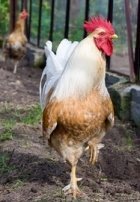
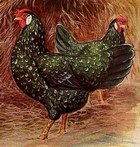
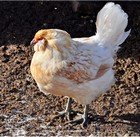
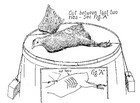
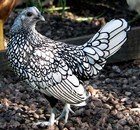

New! Comments
Do you have something of value to add? Leave me a comment in the box below.